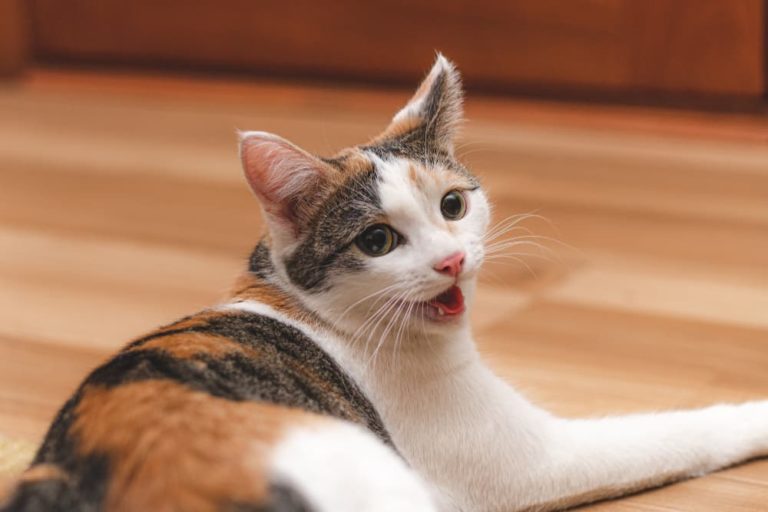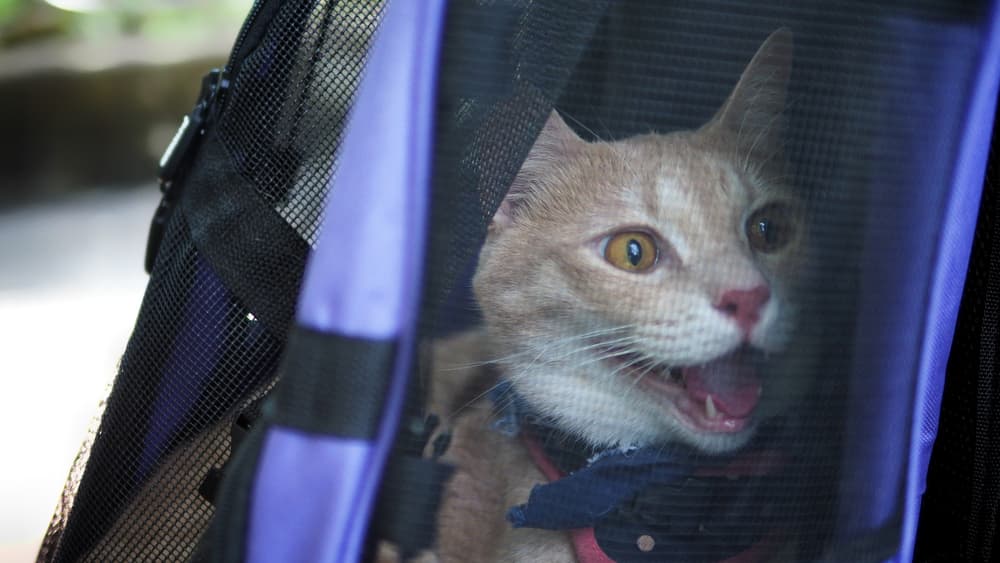Cat Breathing Heavy: 5 Reasons It Happens

Cats can get a case of the zoomies – where they run around like crazy in sudden spurts of energy. This is typically around dusk and dawn, as cats are crepuscular (active at dusk/dawn) animals. Afterward, you may notice your cat breathing heavy.
Is this normal? And when does heavy breathing in cats become a true concern? Let’s explore the topic further.
Understanding Normal Cat Respiration
Cats typically take around 15 to 30 breaths per minute when resting. Kittens and adults both breathe at about the same rate, but many things affect how fast a cat is breathing. During exercise or stress, like veterinary visits, this rate increases.
It is normal for a cat to increase their breathing rate for a short time, but if it persists even when your cat is resting for at least an hour, it could be a sign of an issue.
Panting is frequently seen in dogs due to stress, exercise, and to decrease heat. Panting in cats is uncommon but can be seen in cats who have just exercised intensively and are living in warmer climates. However, if a cat is panting and has been inactive for the past hour, panting is abnormal especially if your cat is in a cool environment.
While breathing in, your cat’s belly moves out and the ribs move out and toward the head (inspiration). When breathing out (expiration), the opposite occurs. It is abnormal for a cat’s belly to move dramatically as if helping your cat to breathe.
If your cat is in respiratory distress – meaning they cannot maintain enough oxygen and are struggling to breathe – he will often breathe fast (tachypnea) as well as breathe hard. Many cats will intermittently breathe with an open mouth, pant, and their nostrils will flare outward to get more air.
Why Is My Cat Breathing Heavy?

Very warm conditions, periods of intense stress, or times of strenuous activity levels for prolonged periods of time will cause your cat to temporarily breathe heavier.
However, cats that are breathing heavy for over an hour without those potential causes are likely to have a serious medical concern. The five most common reasons for heavy breathing in cats are:
Heart Disease
The most common cause of respiratory distress in hospitals. The most common kind of heart disease is hypertrophic cardiomyopathy (HCM). Heart disease can involve any portion of the heart and eventually result in the heart not being able to pump out enough blood. With left-sided heart failure, blood cannot efficiently return to the heart from the lungs, so fluid builds up inside the lungs causing respiratory distress. Heart disease tends to occur in older cats.
Chronic Bronchitis or Asthma
Respiratory conditions are the second most common cause of respiratory distress in hospitals. Chronic bronchitis and asthma result from long-standing inflammation in the smaller airways in the lungs. Eventually, the inflamed and damaged lung tissue cannot process air as it used to. This coupled with a sudden narrowing of the airways leads to respiratory distress. These conditions are typically diagnosed in middle-aged cats.
Pneumonia
Pneumonia means inflammation of the lungs. There are many different causes of pneumonia including viruses, bacteria, and fungi. The inflamed lungs cannot process air as usual. Sometimes fluid builds up outside of the lungs, squishing the lungs and preventing them from completely filling with air. Pneumonia is more common in younger cats.
Cancer
Tumors in the lungs or other places in the chest (such as lymph nodes) can compress airways, making it difficult to breathe. About 1/3 of lung cancers in cats cause a build-up of fluid as well. Lymphoma is the most common cancer identified in the chest.
Trauma
Trauma is the least common cause of heavy breathing in cats. Typically pet parents are aware when trauma occurs. Cats who are hit by a car – or experience other trauma – develop rib fractures (breaks) or bruising (contusions) of the lungs. The pain as well as squishing of lungs or airways results in respiratory distress.
Heavy Breathing Cat: When to Worry
When a cat is breathing heavy, ask yourself: did my cat just finish running around like crazy? If you don’t have air conditioning, that could contribute to heavy breathing – even after light exercise. However, if your cat did not just exercise and it is cool in your house, you should consider it abnormal. Most cats that exercise will cool off over the next hour, and should stop breathing heavily.
Other symptoms that accompany respiratory distress can hint that something is truly wrong. If your cat has a low appetite, no longer wants to be active, and has a change in behavior like hiding then something is definitely wrong.
Sometimes pet parents see reverse sneezing and are afraid their cat is in distress. Reverse sneezing is when something is tickling your cat’s throat, and instead of sneezing outward, he sneezes inward. Reverse sneezing is a strong and sudden spasm of the throat and windpipe and can sound very alarming as if the cat is choking (but he isn’t). Cats pause what they are doing and stretch their neck in order to take in air. As long as this stops after a couple minutes, you shouldn’t worry – but take a video at home and call your veterinarian to ensure it is just reverse sneezing.
What to Do If Your Cat Is Breathing Heavy or Panting

If your cat was not just running around exercising, count how many breaths your cat is taking per minute. Count each time your cat’s chest and belly expand. If the breaths are too fast to count or are higher than 50 breaths per minute, call your veterinarian immediately.
If you notice heavy breathing when your veterinarian is not available, call a local emergency clinic. Take a video of the breathing at home on your phone. This way, you can show the veterinarian what you are seeing.
Signs that you should drive to an emergency hospital right away include if your cat is open mouth breathing (without having just exercised), not wanting to get up or move around, laying on his side, or is not responding to your touch.
